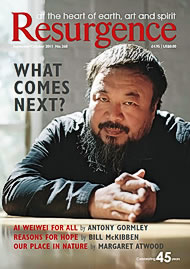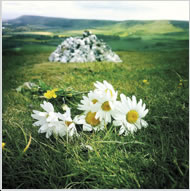Like a roll call of the names of young men lost to war, the ever-growing list of uniquely evolved species that are now extinct – mostly due to humanity’s ignorance and greed – is equally tragic. But unlike our honouring of ‘war heroes’ there are no wreaths, no flowers to mark the place the last Pyrenean brown bear was shot down. Her hibernation caves are now empty – no more will her playful cubs emerge into the spring sunshine.
How unutterably sad.
Where were the poets, the visionaries and the artists when “the Goddess of the River” – the Yangtze dolphin – vanished in China, never again to show her ethereal self from the murky waters of her home? Only empty radio static was picked up by the underwater microphones tracking her movements – her playful spirit gone forever, our concern too late to save her. But humanity did not grieve the passing of this evolutionary miracle.
Recognising this a group of people gathered on Mount Caburn in East Sussex to respectfully say goodbye to the South China tiger, the Sardinian lynx and the myriad species lost forever to our world. They marked these ‘passings’ by laying down the first stones of a Life Cairn “in remembrance of our other selves – our family which yesterday shared this planet with us”: the first memorial for all extinct species. At the same time in the Ecuadorian cloud forest, one of the most biodiverse places on Earth, a group of planetary citizens also gathered to create a Life Cairn and pay tribute to the wondrous species from their region that have also sadly vanished.
These Life Cairns will become places of pilgrimage for all those who need to express their grief for such terrible losses. Andreas Kornevall, one of the founders of the UK Life Cairn, said, “It is hard to face the Eurasian wolf, the Tasmanian tiger and countless others, as a human being, and say sorry. We have to reflect on and atone for what humanity has done. I sensed we gave the animals sentience again; somehow we gave them back their ‘soul’ when building the Life Cairn.”








